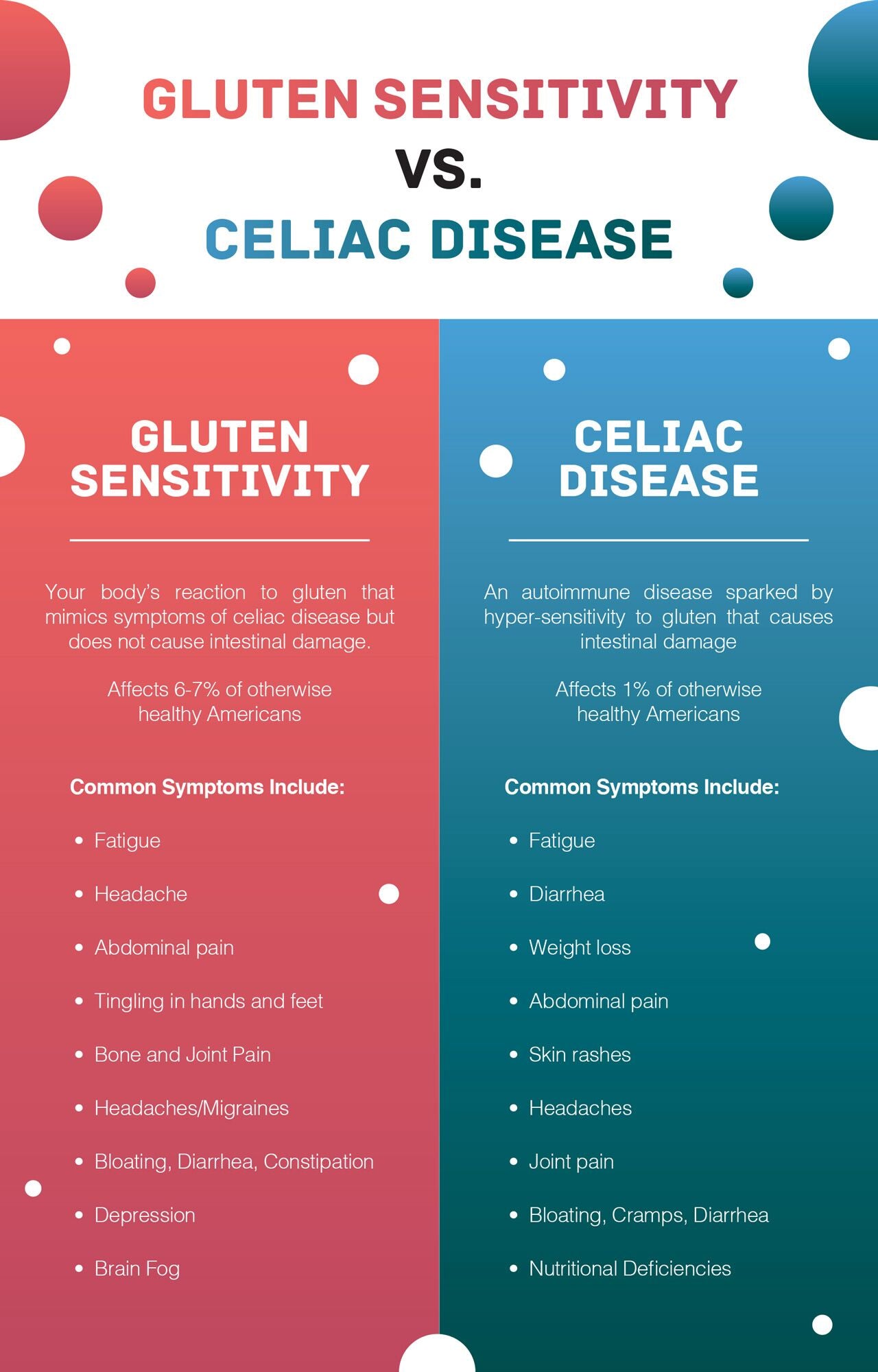Gluten Sensitivity vs. Celiac Disease: Let’s Get the Facts Straight
 By: by Amino Science
By: by Amino Science

Wondering about gluten sensitivity vs. celiac disease? Let’s get the facts straight!
A gluten-free diet can be beneficial for people who are gluten sensitive and for people who have celiac disease—but the two conditions should not be interpreted as one and the same.
Gluten sensitivity and celiac disease involve two different responses to the gluten protein, found in the grains wheat, barley, and rye. Symptoms are similar, which makes it hard to determine which condition you might have without the diagnostic help of specific medical tests.
Gluten Sensitivity
Gluten sensitivity, also called non-celiac gluten sensitivity, is not an autoimmune disease, and it does not cause intestinal damage as celiac disease does. Diagnosis of gluten sensitivity can be difficult. According to a study published in Gastrointestinal Endoscopy Clinics, gluten sensitivity symptoms are subjective.
Common symptoms include:
- Fatigue
- Headache
- Abdominal pain
- Tingling in hands and feet
Usually, a gluten-free diet is recommended, but it is still difficult to determine if the cause of these symptoms is indeed gluten.
There's also a need to differentiate between gluten sensitivity and a wheat allergy. You can have sensitivity to gluten and not be allergic to wheat. A food allergy such as a wheat allergy produce positive IgE assays on a total IgE test, which is a blood test used to screen for allergies and parasitic infections. Wheat allergies are also determined by skin prick tests and food challenges.
Celiac Disease
Celiac disease is an autoimmune disease that damages the intestine and has long-term health consequences. Symptoms include:
- Fatigue
- Diarrhea
- Weight loss
- Abdominal pain
- Skin rashes
- Headaches
- Joint pain
Celiac disease occurs when the immune system reacts to gluten ingestion by attacking the lining of the intestine. This immune response results in intestinal damage and malabsorption of nutrients—and it can cause conditions such as osteoporosis.
Celiac disease is autoimmune in nature, which means that gluten is not directly responsible for the damage. The immune system’s reaction to the gluten protein urges white blood cells to attack the lining of the intestine. Celiac disease is also associated with other autoimmune conditions, including autoimmune thyroid disease and type 1 diabetes.
Gluten Sensitivity vs. Celiac Disease
The HuffPost interviewed Alessio Fasano, M.D., medical director of the University of Maryland Center for Celiac Research, to understand the difference between gluten sensitivity and celiac disease. He suggests looking at gluten ingestion on a spectrum at the end of which is celiac disease. Celiac disease causes damage to the lining of the small intestine and malabsorption of nutrients. At the other end of the spectrum, we find the lucky people who consume gluten without experiencing any discomfort. In the middle, there are people who are sensitive to gluten.
The main difference between the two conditions is that gluten sensitivity does not cause the intestinal damage that characterizes celiac disease. Patients with gluten sensitivity present a prevalence of extraintestinal instead of gastrointestinal symptoms, including behavioral changes, bone or joint pain, muscle cramps, leg numbness, weight loss, and fatigue. Typical gastrointestinal symptoms, instead, include abdominal bloating and gas.

Is Gluten Sensitivity the Same as Gluten Intolerance?
As we are talking about the differences among diseases connected to gluten, it is important to mention that gluten sensitivity is sometimes referred to as gluten intolerance; however, this moniker has fallen out of fashion. Since 2012 and at the discretion of top gluten-disorder researchers, gluten sensitivity, not gluten intolerance, is the proper way to refer to the condition.
How to Determine if You Have Gluten Sensitivity or Celiac Disease
We have mentioned above that the gastrointestinal and extraintestinal symptoms of gluten sensitivity and celiac disease are similar. For these reasons, it can be hard to reach a definitive diagnosis. According to Beyond Celiac, an awareness and advocacy group for celiac disease, as many as 83% of Americans with celiac disease don't know they have it or have been misdiagnosed with another medical condition.
A study conducted by Dr. Fasano recommends a diagnostic algorithm that can help determine if you have one or the other. According to the suggested method, the doctor has to rule out celiac disease using specific blood tests. Then the patient participates in a gluten elimination diet, first cutting out gluten from the diet to see if symptoms disappear, then adding gluten back into the diet to see if symptoms return. If symptoms return after you start eating gluten again, it indicates gluten sensitivity.
There are several blood tests available to determine if you have celiac disease, but the most common is the tTG-IgA test. You need to eat gluten for the test to work, and if the result suggests celiac disease, the doctor will recommend a biopsy of the small intestine to confirm the diagnosis. This procedure is performed by a gastroenterologist. During the procedure the intestine is analyzed to see if there is any damage connected to celiac disease.
Experts recommend testing for celiac disease if you have first-degree relatives with celiac disease and if you have an associated autoimmune disorder or other condition, especially type 1 diabetes, autoimmune thyroid disease, autoimmune liver disease, Down syndrome, Turner syndrome, Williams syndrome, and selective immunoglobulin A (IgA) deficiency. Children older than 3 and adults experiencing symptoms of celiac disease should also be screened.
Eating a Gluten-Free Diet
Whether it's celiac disease or gluten sensitivity the prescription for better health is to stick to eating gluten-free foods.
Steer clear of gluten-containing foods such as:
- Wheat and its derivatives
- Rye
- Barley
- Malt
- Tritical
- Brewer's yeast
- Wheat starch
- Pasta and noodles
- Crackers and potato chips
- Backed goods
- Cereals
- French fries
- Salad dressings
- Soup
Of course, there's a wealth of gluten-free products, such as gluten-free pasta and bread, to replace any of your favorite foods that contain gluten on the list above. Look for gluten-free labels, and get used to checking the ingredient labels for gluten, which, remember, hangs out in:
- Wheat
- Barley
- Rye
- Malt
- Brewer’s yeast
- Oats
Could FODMAPs Be to Blame?
Although there's much to be uncovered about celiac disease and gluten sensitivity, recent research indicates that the ingestion of gluten isn't the only culprit. Apparently FODMAPs may be partly to blame for gluten sensitivity. FODMAPs are sugar alcohols and short-chain carbohydrates that the body has a difficult time digesting. And guess what's high in FODMAPS? The gluten-rich grains wheat, barley and rye!
Eating a low-FODMAP diet of the following foods may help ease the symptoms of gluten sensitivity.

Keep in mind that when we restrict certain foods from our diets, it can lead to nutritional deficiencies. If you decide a low-FODMAP diet is for you, be sure to meet your protein needs with a balanced essential amino acid supplement.

Up to 25% off Amino
Shop NowTAGS: conditions
Join the Community
Comments (0)
Most Craveable Recipes




 833-264-6620
833-264-6620



















